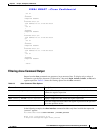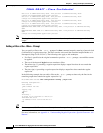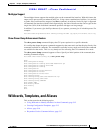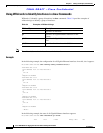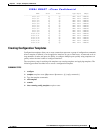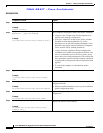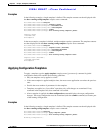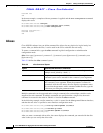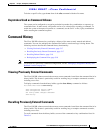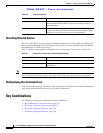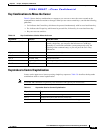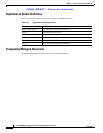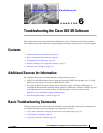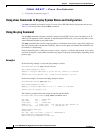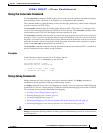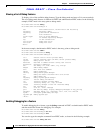
FINAL DRAFT —Cisco Confidential
5-17
Cisco ASR 9000 Series Aggregation Services Router Getting Started Guide
OL-17502-01
Chapter 5 CLI Tips, Techniques, and Shortcuts
Command History
To delete a specific alias, type the no form of the alias command with the alias name.
Keystrokes Used as Command Aliases
The system can be configured to recognize particular keystrokes (key combination or sequence) as
command aliases. In other words, a keystroke can be set as a shortcut for executing a command. To
enable the system to interpret a keystroke as a command, use the Ctrl-V or Esc, Q key combination
before entering the command sequence.
Command History
The Cisco IOS XR software lets you display a history of the most recently entered and deleted
commands. You can also redisplay the command line while a console message is being shown. The
following sections describe the command history functionality:
• Viewing Previously Entered Commands, page 5-17
• Recalling Previously Entered Commands, page 5-17
• Recalling Deleted Entries, page 5-18
• Redisplaying the Command Line, page 5-18
Note To roll back to a previously committed configuration, see the “Managing Configuration History and
Rollback” section on page 4-6.
Viewing Previously Entered Commands
The Cisco IOS XR software records the ten most recent commands issued from the command line in its
history buffer. This feature is particularly useful for recalling long or complex commands or entries,
including access lists.
To display commands from the history buffer, type the show history command as follows:
RP/0/RSP0/CPU0:router# show history
show configuration history commit
show configuration commit list
sho config commit changes 1000000001
show history
Recalling Previously Entered Commands
The Cisco IOS XR software records the ten most recent commands issued from the command line in its
history buffer. This feature is particularly useful for recalling long or complex commands or entries,
including access lists.
To recall commands from the history buffer, use one of the commands or key combinations listed in
Table 5-6.



